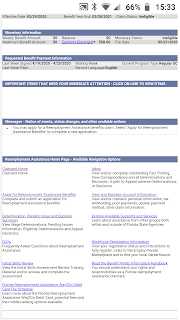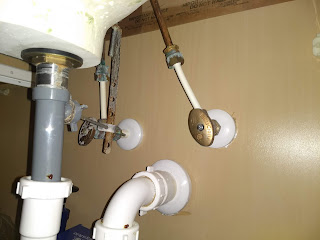I needed two new heat pumps for the house, so I went and got my obligatory quotes. I won't get too much into the process right now (or even the company I chose), since what I wanted to do was concentrate on why a single-stage heat pump is just fine, even in Jacksonville, and even as dual-stage and multi-stage (variable speed) units are much sexier.
Cost
You can expect to pay a few thousand dollars more for a dual stage system, and then a few thousand more than that for a multi-stage. Having two systems (upstairs and downstairs), I could have easily doubled my bill. My lowest quote for a 14 SEER single-stage system was around $7500, while I had two salesmen try to push me into the multi-stage systems for nearly $15,000. These are different companies and different brands, but there is almost no way to recoup the cost. One technician doubling as a salesman (and NOT pushing multi-stage) said you can expect maybe $5 to $10 a month per higher SEER in savings. So an extreme example would be from 14 to 21 SEER. A difference of 7 for each unit or 14 for the set, and a savings of $140 per month (which isn't even possible based on what I pay right now, but whatever). Maybe $1500 a year if you are a total energy hog. So, that $15,000 unit is finally going to start saving you money after its fifth year in service. Theoretically.
There is a way to take a lower-SEER heat pump and boost it a bit with a variable speed air handler, but the cost of turning a 14 SEER into a 14.5 SEER for my house would have cost only $400 less than just buying the 16 SEER unit, partially because the 16 SEER qualified for the $150 JEA rebates ($300 on two units). However, you might find that a special air handler can help your budget system operate more efficiently.
I should also mention the option of fixing the current system. Since it's the old refrigerant, it would have cost a lot, and I know that both units were leaking. So you figure $1,000 for maybe a year or two of operation (if we were lucky). If the refrigerant wasn't outdated (or if the realtor guy from next door was offering to come fill mine up like he did that one at midnight), then I might have rolled the dice, but my wife would have been very upset had I blown $1,000 now and then still had to replace one or both units in six months.
It's also worth mentioning that most AC places will offer revolving credit loans at 0% interest. The one I am getting is for one year at 0%, but some go as high as five years, though that will sometimes disqualify you for other offers. One HVAC owner/salesman said that he would give me a better cash price and that the 0% offers all had fees built in, but he also sold me hard on the variable speed option. And his cash price was still higher than another installer with the same product offering 60 months of 0%, so go figure. Some warnings: 0% credit card loans (through Wells Fargo) are going to lower your credit score until paid off, since they are considered revolving credit rather than a loan. And you'll owe all kinds of interest if you miss a payment, so be careful with them.
Efficiency
I was reading an article from SFGate that said that two-stage units don't tend to get close to listed SEER ratings. It's probably like the old MPG ratings, or some of the electric car MPG ratings. Perfect world ratings. Back in 2006, two-stage units were only getting 60 to 85% of advertised efficiency. I am not sure if a newer study has looked at real-world performance in multi-staging, but the article said that single stage unit SEERs were pretty accurate. Salesmen seem to make you think the multi-stage units are so efficient that JEA will be owing YOU money every month, but the reality is that I spend less than $200 a month on electric, and even if my AC accounts for $150 of that total, there is no way two 21 SEER units are going to save me $10 a month per SEER over my 10 SEER system, since that would be like $220 in savings each month, and I only spend $150. If we instead just say a 15 SEER is 1.5 times as efficient and a 20 SEER is twice as efficient as my 10 SEER setup, then my 20 SEER bill for electric would be $75 per month, and maybe $70 for a 21 SEER. And a 15 seer might be $100 a month instead of $150. A 14 SEER might be closer to $110 a month, or $40 more than the 21, meaning the real efficiency savings of investing in unit double the price would take around 15 years to realize the savings in initial cost through efficiency, right about at the time you'll need to replace the unit.
The first salesman also tried to convince me that my 10 SEER units were so old (16 years) that they were no longer operating at 10 SEER. He even had some kind of pseudo-mathematical equation of how much efficiency is lost every year, and he claimed that the 20+ SEER unit he was selling me was going to stop that yearly loss of efficiency. However, he failed to take into account the new unit's own yearly loss of efficiency. It's not like you're installing a NEW 21 SEER unit every year, so it will presumably also be affected by the same loss. And I don't really buy it, anyhow. I have a 1986 Bertone X 1/9 that has consistently averaged 30 mpg highway for me since I bought it in 1996, and that's above the 26 mpg EPA estimate. It doesn't like to start consistently, but the efficiency of the engine has remained pretty constant over time. So I just don't think I buy that there's a loss of SEER efficiency just by a unit running, as long as it's operating properly. Maybe I am all wrong here, but the fact remains that I'm not paying $500 a month for AC right now, and I don't expect that a new unit will slash the prices to nothing.
Maintenance
Theoretically, a two-stage or multi-stage heat pump could cost more in maintenance. More parts. More technology running those parts. Fewer techs who can handle the system. Shorter track record. I guess I'd assume it's basically a wash, since most techs probably know what to do, and the warranty periods are the same. No, your great-uncle who can fix anything probably won't be able to fix your multi-stage heat pump, just like you shouldn't let him touch your Tesla for repairs.
I read one article that implied that the jury is out on whether or not multi-stage units will hold up over the long haul, since machines are generally created to be on or off rather than operate at all different percentages. I remember people making similar arguments against cruise control for cars, but in reverse, saying that car engines weren't meant to run at the exact same rpm all the time. Mainly, we just don't know if the repair rate will somehow be higher in multi-stage units because they spin slowly for a good portion of the day. It will probably prove to be about the same as single-stage for repairs, but I wasn't sure I wanted to be in the test group for a new way of running AC units. The next decade will tell if variable speed compressors are as reliable (or more reliable) than single speed ones, but I wasn't terribly interested in being part of the experiment.
Resale
I live in a middle-of-the-road neighborhood in Jacksonville. Houses go for $200,000 up to around $400,000. We have to be careful that we don't over-update our house. The house I own in Milwaukee has quartz counters and is probably the highest-valued house on the block, but we'll never recover the investment on the counters because of the area. People shopping for a house in my neighborhood will mostly see single speed heat pumps in the other homes. And looking around, I see plenty of Goodman units, so it's not like the neighbors are all purchasing multi-stage Carriers. If we sell in the next five years, a newish 16 SEER unit will still be about average. If our house was in Ponte Vedra or Avondale, buyers would expect variable speeds and UV filters, but not really in East Arlington. Besides, most people moving to my part of Jacksonville are moving from outside of Florida, often from cooler climates. I didn't even know what a heat pump was until I got here, and I had no clue that central air units could operate at different speeds. Since realtors aren't HVAC salesmen, it would be hard for them to explain why one house is worth $5,000 more than another one just because of some fancy AC.
If you really need to be super-comfortable or have breathing or other health issues, then a multi-stage, variable-speed, perfect-all-the-time system might make sense, even in a middle-class house. You might find a buyer with a kid who has asthma or a couple with their first child on the way. I understand that we might have to adjust the temperature once in a while to force the new heat pump to kick in or turn off, but I'd rather save the thousands on the heat pump to invest in windows that will help resale value and to control the temperature fluctuations in the house.
Conclusion
Highly-efficient heat pumps still do not make cooling or heating your house free, so you need to weigh the benefits of two-stage or variable speed compressors against the initial cost. You are not going to make up the difference in energy savings or resale value very quickly (if at all), so it really has to be about the desire to have an extra-comfortable environment inside your home. If you work from home or plan on extended time at home with various pandemics over the next decade, then it's probably worth the money. About half of the sales people coming to your house will push the higher-end models, and the real sleazy ones will try to make sure your wife is part of the conversation so that he can use one of you against the other. You need to make the right choice for you, however. Right now and in a middle class neighborhood, that best overall choice is probably still single-stage
Search New Jax Witty
Thanks for reading. See more of my content:
Satisfamily - Articles about being happy as a family
Passive Ninja - Web Design in Jacksonville
McNewsy - Creative Writing
Educabana - Educational Resources
Brave New Church - Church Website Design
Voucher School - Pros and Cons of School Vouchers
Luthernet - Web Design for Lutheran Churches
Sitcom Life Lessons - What we've learned from sitcoms
Mancrush Fanclub - Why not?
Epic Folktale - Stories of the unknown
Wild West Allis - Every story ever told about one place
Educabana on Teachers Pay Teachers (mostly ELA lessons)
Real Wisconsin News - Satire from Wisconsin
Zoo Interchange Milwaukee - Community website
Chromebook Covers - Reviews and opinions
Brian Jaeger - Resume (I'm always interested)
Contact Me








